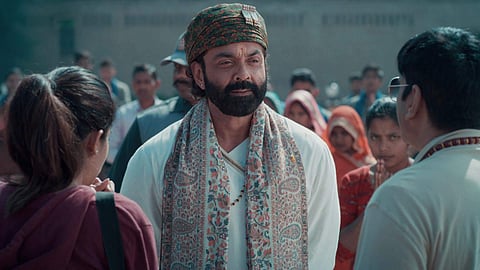Aashram web series Review: An effective but conflicting commentary on the failings of faith
Rating:(3 / 5)
Aashram, a series about a conman in the garb of a godman, introduces Baba Nirala (an effective Bobby Deol) like a superstar in a masala film. A hospital is under siege by some upper caste hooligans to delay the treatment of a Dalit who was beaten up by them. The police are trying to broker peace between the victim and the oppressor instead of meting out justice. Baba Nirala walks into the hospital with much fanfare and proves he is no ordinary peace-loving, aashirwad-giving, docile-natured ascetic. In fact, he is a literal ball-buster who manages to wring out justice from those hooligans. The Baba becomes Babaji in the eyes of these oppressed people. And over the next nine episodes, we see how Baba’s projection as the one true saviour has obviously nefarious purposes.
Aashram takes its time to talk about how a circle of trust is built around such controversial figures, and how this power structure is deeply interlinked with politics. It is a neat move to model Babaji around more than one notorious real-life godman. After a point, it becomes a case of playing match what’s unfolding onscreen to the corresponding real-life incident. However, Aashram is not just about the machinations of a con/godman. It is also about the inherent casteism present in various sections of society. That is probably why, more than the colourful life of Baba Nirala, it is Darshan Kumaar’s Ujagar Singh who is the most conflicted character in the series.
Ujagar is the cop who advises those Dalit people to not file a case of attempted murder against the upper caste hooligans who beat them up. The same Ujagar is in-charge of investigating the case of a buried body dug out after a few years. Initially, he has no qualms in dancing to the tune of his seniors, who want the case closed due to political influence. But soon, he has a change of heart because he falls in love (at first sight, no less) with Dr Natasha (Anupriya Goenka) who wants to get to the bottom of the case. While this reason for becoming a good cop might seem flimsy, it is still okay. What’s not okay is his deep-rooted disdain for the quota system in the police. He is furious that a corrupt Dalit cop is favoured for promotion. Ujagar, who is called a Manuwadi for his beliefs, refers to the promoted cop with veiled casteist slurs.
Now, this same series talks about how the blatant oppression of Dalits is going unchecked in our society. This same series talks about how this oppression is not just a bunch of isolated incidents but a deeply systemic issue. The same series shines the light on the unholy nexus between godmen and political leaders. We see how the shady dealings of such ashrams go unnoticed because some political leaders see the followers as vote banks.
Now, do we write this off as inconsistent writing or read deeper into it? Is it possible for a nice person in pursuit of justice to be casteist too? Is it possible for a Dalit cop to receive that promotion if he didn’t side with the Baba, who is perceived to be the saviour of oppressed sections of that area? The world doesn’t exist in binaries, and Aashram is all about such grey areas. Baba is a man who tells Pammi (Aaditi Pohankar), a runaway wannabe Sadhvi, to go back home and be with her parents because they have her best interests in mind. Baba also runs charitable schools, colleges and hospitals. On the other hand, he drugs some of his followers and forces them to undergo a “purification” process. While the visuals of this process allude to some sort of sinister medical procedure akin to organ harvesting, the reality was more perverse and shocking.
Given Prakash Jha has dealt with such controversial topics in his feature films, there was curiousity to see what he would do with this fascinating premise on an uncensored platform. But for a mainstream filmmaker like Prakash Jha, skirting around such themes to avoid too many cuts, must be second nature by now. That may be why there is a lot of self-censoring in Aashram.
Lack of censorship aside, this medium has also become a treasure trove for actors who would otherwise be relegated to two-bit roles in mainstream cinema. The more we see of Chandan Roy Sanyal's Bhopa, Aaditi’s Pammi, Tridha Choudhury’s Babita, and Tushar Pandey’s Satti, the more we want to celebrate the OTT medium.
When we are finally left with Baba Nirala sitting at his sprawling ashram overlooking a lake and meditating, we want to know more. How did Monty become Baba Nirala? Why does Baba have nightmares about a long-dead girl? How did the dogged persistence of some members of the police and media bring down the empire? Aashram might have shrouded itself with unending controversies, but what really determines the success of a web series is its binge-worthiness. And on that count, Aashram is a sure winner.

